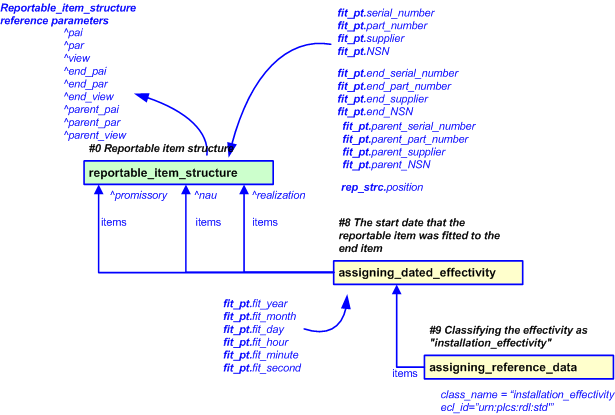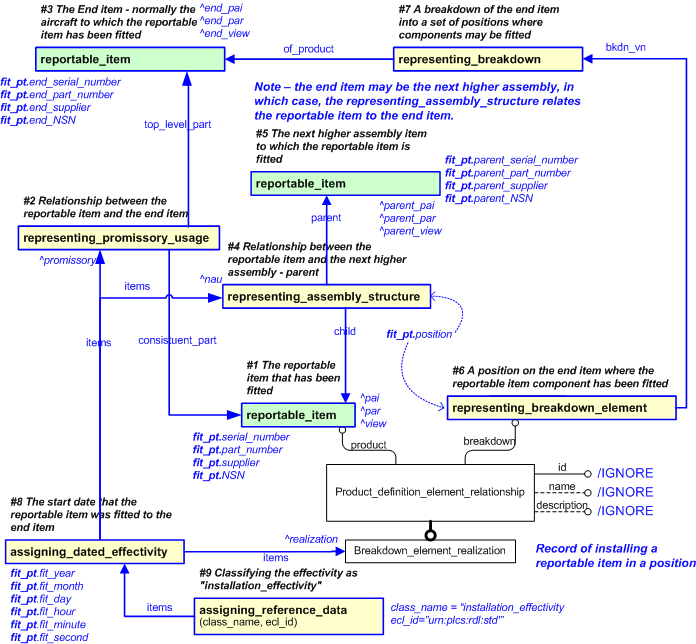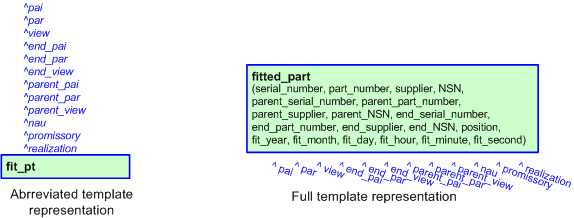Template:— fitted_part (fit_pt)
Context:— MoDAvDEX |
Date: 2008/01/18 13:09:25
Revision: 1.3
|
This section specifies the template fitted_part.
NOTE
The template has been defined in the context of
MoDAvDEX.
Refer to the business context for details of related templates.
NOTE
An explanation of a template and the associated instantiation path is
provided in the
Template overview
section.
This template describes how to represent represent parts fitted to an aircraft
The EXPRESS-G diagram in
Figure
1
shows the templates and EXPRESS entities that are required
to represent the template
"fitted_part".
The text highlighted in blue shows the template parameters.
Figure 1 — An EXPRESS-G representation of the Information model for fitted_part
The EXPRESS-G diagram in
Figure
2
shows the templates and EXPRESS entities that are required
to represent the template
"fitted_part".
The text highlighted in blue shows the template parameters.
Figure 2 — An EXPRESS-G representation of the Information model for removed_part
The graphic for the template to be used in other EXPRESS-G diagrams
is shown in Figure
3
below.
Figure 3 — The graphical representation of the fitted_part template
The following input parameters are defined for this template:
The serial_number of the reportable item that has been fitted.
The part_number of the reportable item that has been fitted.
The supplier of the reportable item that has been fitted.
NSN (Default=/NULL,Type='STRING')
The NSN of the reportable item that has been fitted.
The serial_number of the parent on which the reportable item has been fitted
The part_number of the parent on which the reportable item has been fitted
The supplier of the parent on which the reportable item has been fitted
The NSN of the parent on which the reportable item has been fitted
The serial_number of the end item which the reportable item has been fitted
The part_number of the end item which the reportable item has been fitted
The supplier of the end item which the reportable item has been fitted
end_NSN (Default=/NULL,Type='STRING')
The NSN of the end item which the reportable item has been fitted
The position on the end item in which the reportable item has been fitted
Calendar_date year_component of the date and time that the reportable item was fitted.
Calendar_date month_component of the date and time that the reportable item was fitted.
Calendar_date day_component of the date and time that the reportable item was fitted.
Local_time hour_component of the date and time that the reportable item was fitted.
Local_time minute_component of the date and time that the reportable item was fitted.
Local_time second_component of the date and time that the reportable item was fitted.
The following reference parameters are defined for this template:
Allow the
Product_as_individual
entity instantiated in this path to be referenced when this template is used.
%^target = $fitted_part.pai%
Allow the
Product_as_realized
entity instantiated in this path to be referenced when this template is used.
%^target = $fitted_part.par%
%^target = $fitted_part.view%
Allow the
Product_as_individual
entity instantiated in this path to be referenced when this template is used.
%^target = $fitted_part.end_pai%
Allow the
Product_as_realized
entity instantiated in this path to be referenced when this template is used.
%^target = $fitted_part.end_par%
%^target = $fitted_part.end_view%
Allow the
Product_as_individual
entity instantiated in this path to be referenced when this template is used.
%^target = $fitted_part.parent_pai%
Allow the
Product_as_realized
entity instantiated in this path to be referenced when this template is used.
%^target = $fitted_part.parent_par%
%^target = $fitted_part.parent_view%
Allow the
Next_assembly_usage
entity instantiated in this path to be referenced when this template is used.
%^target = $fitted_part.nau%
Allow the
Promissory_usage
entity instantiated in this path to be referenced when this template is used.
%^target = $fitted_part.promissory%
%^target = $fitted_part.realization%
The following parameter combinations specify a uniqueness constraint:
Unique constraint: Unique end item
The end item should only occur once in a data set.
Unique constraint: Unique parent item
The parent item should only occur once in a data set.
Unique constraint: Unique reportable item
Each instance of the
entity
(
Product_as_individual)
within the data set shall be uniquely identified
by a combination of the following parameters on this
template (fitted_part) namely:
serial_number,
part_number,
supplier.
The
instance is
referenced by the following template parameter:
pai.
The reportable item should only occur once in a data set.
The instantiation path shown below specifies the entities that are to be
instantiated by the template.
A description of templates and the syntax for the instantiation path is
provided in the
Templates Help/Information section.
/
reportable_item_structure(
serial_number=@serial_number,
part_number=@part_number,
supplier=@supplier,
NSN=@NSN,
parent_serial_number=@parent_serial_number,
parent_part_number=@parent_part_number,
parent_supplier=@parent_supplier,
parent_NSN=@parent_NSN,
end_serial_number=@end_serial_number,
end_part_number=@end_part_number,
end_supplier=@end_supplier,
end_NSN=@end_NSN,
position=@position)/
%^end_pai = $reportable_item_structure.end_pai%
%^end_par = $reportable_item_structure.end_par%
%^end_view = $reportable_item_structure.end_view%
%^nau = $reportable_item_structure.nau%
%^pai = $reportable_item_structure.pai%
%^par = $reportable_item_structure.par%
%^view = $reportable_item_structure.view%
%^parent_pai = $reportable_item_structure.parent_pai%
%^parent_par = $reportable_item_structure.parent_par%
%^parent_view = $reportable_item_structure.parent_view%
%^promissory = $reportable_item_structure.promissory%
%^realization = $reportable_item_structure.realization%
-- assign the dated effectivity -- Note there are three assignments here. A single assignment could -- be assigned to ^realization ^promissory ^nau /
assigning_dated_effectivity(
start_year=@fit_year,
start_month=@fit_month,
start_day=@fit_day,
start_hour=@fit_hour,
start_minute=@fit_minute,
start_second=@fit_second,
start_sense='.EXACT',
start_hour_offset='0',
start_minute_offset='0',
end_year='',
end_month='',
end_day='',
end_hour='',
end_minute='',
end_second='',
end_sense='.EXACT',
end_hour_offset='0',
end_minute_offset='0',
role_class_name='0',
role_ecl_id='urn:plcs:rdl:std',
items= ^nau)/
%^eff1 = $assigning_dated_effectivity.dated_effectivity%
/
assigning_reference_data(
class_name='installation_effectivity',
ecl_id='urn:plcs:rdl:std',
items=^eff1)/
-- assign the dated effectivity -- Note - there are three assignments here. A single assignment could -- be assigned to ^realization ^promissory ^nau /
assigning_dated_effectivity(
start_year=@fit_year,
start_month=@fit_month,
start_day=@fit_day,
start_hour=@fit_hour,
start_minute=@fit_minute,
start_second=@fit_second,
start_sense='exact',
start_hour_offset='0',
start_minute_offset='0',
end_year='',
end_month='',
end_day='',
end_hour='',
end_minute='',
end_second='',
end_sense='',
end_hour_offset='',
end_minute_offset='',
role_class_name='0',
role_ecl_id='urn:plcs:rdl:std',
items=^promissory)/
%^eff2 = $assigning_dated_effectivity.dated_effectivity%
/
assigning_reference_data(
class_name='installation_effectivity',
ecl_id='urn:plcs:rdl:std',
items=^eff2)/
-- assign the dated effectivity -- Note - there are three assignments here. A single assignment could -- be assigned to ^realization ^promissory ^nau /
assigning_dated_effectivity(
start_year=@fit_year,
start_month=@fit_month,
start_day=@fit_day,
start_hour=@fit_hour,
start_minute=@fit_minute,
start_second=@fit_second,
start_sense='.EXACT',
start_hour_offset='0',
start_minute_offset='0',
end_year='',
end_month='',
end_day='',
end_hour='',
end_minute='',
end_second='',
end_sense='',
end_hour_offset='',
end_minute_offset='',
role_class_name='0',
role_ecl_id='urn:plcs:rdl:std',
items=^nau)/
%^eff3 = $assigning_dated_effectivity.dated_effectivity%
/
assigning_reference_data(
class_name='installation_effectivity',
ecl_id='urn:plcs:rdl:std',
items=^eff3)/
Characterizations
No common characterizations of the template
fitted_part
have been identified. However, the ISO 10303-239 EXPRESS model
may enable other assignments to the entities instantiated by the template.



